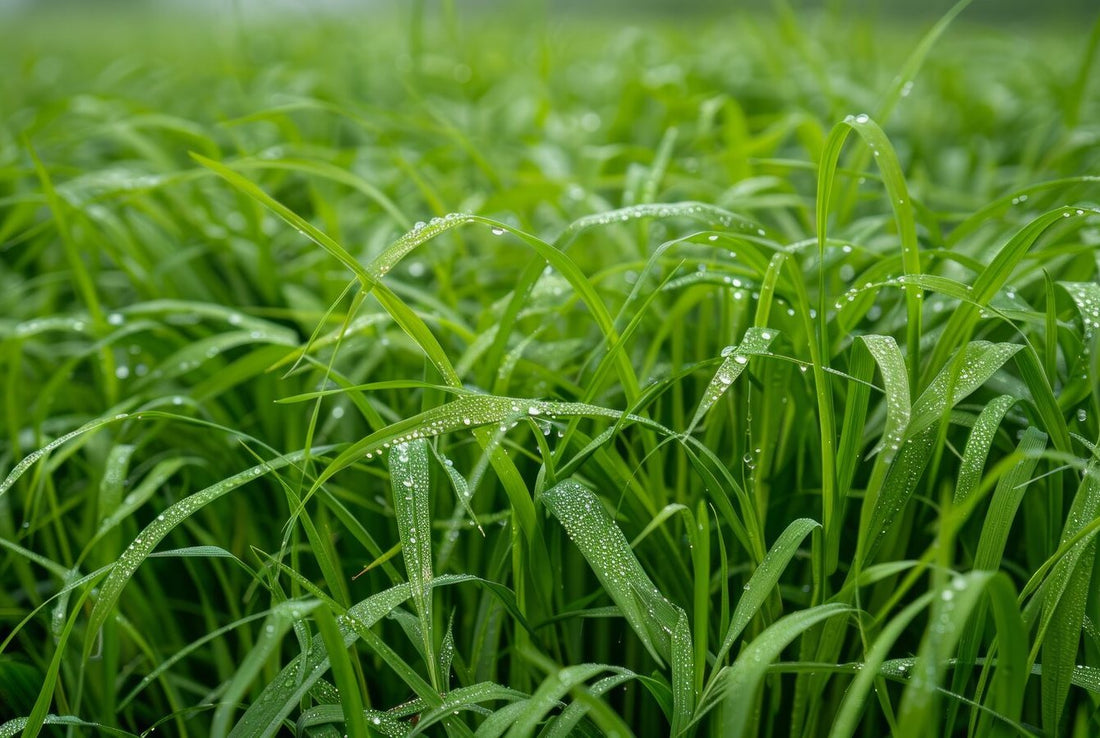If you're looking to achieve a lush, green lawn in Maryland, you've come to the right place. Maryland's unique climate allows for both cool-season and warm-season grasses to thrive, depending on where you live.
In this article, we'll dive deeper into the best grass seed for Maryland, taking into account the state's varying conditions and soil types.
As trusted experts in lawn care, we know that selecting the right seed is key to a healthy, beautiful yard. We'll explore which grass types work best, why they suit Maryland lawns, and how to care for them.
So, if you're ready to transform your lawn with the best grass seed for Maryland, continue reading to learn more about which varieties will help you achieve that dream yard.
What this article covers:- Climate and Soil in Maryland
- Best Grass Seeds for Maryland
- Cool-Season Grasses
- Warm-Season Grasses
- When to Plant Grass Seed in Maryland
Climate and Soil in Maryland
Maryland's climate ranges from warm, humid summers to cooler, harsher winters, especially in the northern regions.
Summers in the south can be hot and humid, while the higher elevations in the west tend to experience cooler conditions.
Spring and fall bring milder weather, making these seasons ideal for growing grass. The soil throughout Maryland is generally clay-based, which means it retains moisture well but can compact easily, requiring proper aeration to promote healthy root growth.
Nearly all soils in Maryland contain a mix of sand, silt, and clay, further influencing how well different grass types will perform.
This combination of diverse climates and soil types requires grass seeds that can withstand both heat and cold.
A blend of cool-season and warm-season grasses ensures year-round growth and resilience, making it the best choice for Maryland lawns.
By understanding these conditions, we can confidently recommend the best grass for Maryland's unique environment.

Best Grass Seeds for Maryland
Our findings show that a mix of cool-season and warm-season grasses ensures your lawn stays green and healthy throughout the year. Let's explore the best options for each season.
Cool-Season Grasses
Cool-season grasses are ideal for the cooler northern parts of Maryland, thriving in spring and fall.
Tall Fescue
Tall fescue is a top choice for Maryland lawns due to its deep roots, which help it stay green during dry spells and allow it to adapt to a range of soil types. Its versatility makes it a popular option in both hot, dry summers and cooler seasons.
Lesco All Pro Transition Grass Seed is an excellent example of tall fescue varieties, providing durable turf that can handle drought, heat, shade, and heavy foot traffic.
These grass seed varieties contain endophytes, offering increased resistance to surface-feeding insects.
When planted at the recommended rates, this blend produces a dense, fine-textured turf that requires less frequent mowing, thanks to its slow growth rate.
Tall fescue is also highly resistant to common lawn diseases like brown patch and leaf spot, making it lower maintenance.
This grass can withstand colder temperatures, ensuring it survives harsh winters. Additionally, it recovers quickly from damage, ensuring a healthy lawn even with regular use.
Its adaptability allows it to thrive in a variety of soil types and environmental conditions, which is why it's a popular choice in regions like best grass seed for Tennessee and best grass seed for Oklahoma.
Perennial Ryegrass
Perennial ryegrass is an excellent option for overseeding, especially when you need to fill in patchy areas quickly.
It germinates faster than most other cool-season grasses, establishing itself within a short period.
This fast-growing grass is known for providing a lush, vibrant green lawn during cooler months, making it ideal for fall and winter overseeding.
Its adaptability to different soil types and its ability to handle heavy foot traffic are key reasons why it's a top choice in various regions.
Whether you're looking for the best grass seed for Massachusetts, best grass seed for Indiana, or best grass seed for Utah, perennial ryegrass stands out as a reliable option that thrives in these climates, ensuring a healthy and resilient lawn year-round.

Fine Fescue
Fine fescue is an ideal choice for areas with limited sunlight, such as under trees or along shaded parts of your yard.
It thrives in low-light conditions where other grass types struggle. Not only is it shade-tolerant, but fine fescue also requires minimal water, making it a low-maintenance option for homeowners looking to reduce their lawn care workload.
Its ability to grow in less-than-ideal conditions, such as dry, shaded spots, sets it apart from other grass types.
Whether you have tricky areas in your yard or simply want a more resilient, easy-care grass, fine fescue is an excellent solution for maintaining a green, healthy lawn with little effort.
Kentucky Bluegrass
Kentucky bluegrass is widely appreciated for its fine texture and vibrant, rich color, making it a popular choice for lawns that need a polished, attractive appearance.
It thrives in cooler climates, growing best in regions with mild summers and cool winters. However, to maintain its lush and dense coverage, Kentucky bluegrass requires more water and regular care than some other grass types.
Its shallow root system means that it may need frequent watering, especially during dry periods, to keep it healthy and green.
For those in states like Pennsylvania looking for the best grass seed for PA, Kentucky bluegrass is an excellent choice, as long as you're prepared to give it the extra attention it needs to stay lush and beautiful.
Warm-Season Grasses
For the southern parts of Maryland where summers are hotter, warm-season grasses are your go-to choice.
Zoysia Grass
Zoysia grass is an excellent choice for homeowners looking for a durable lawn that thrives in hot climates.
Known for its ability to withstand high temperatures and heavy foot traffic, Zoysia creates a dense, cushioned lawn that feels soft underfoot.
This makes it ideal for high-traffic areas such as backyards, sports fields, or playgrounds. Zoysia's deep root system allows it to tolerate drought conditions better than many other grass types, reducing the need for frequent watering.
Additionally, it grows slowly, which means less mowing is required, making it a low-maintenance option for busy homeowners.
Zoysia's resilience and adaptability make it a great choice for those seeking a long-lasting, attractive lawn that can handle tough conditions while remaining lush and green throughout the warmer months.

St. Augustine
St. Augustine grass is an excellent choice for lawns in warmer climates, especially in regions like Maryland that experience hot, dry summers.
This grass variety is well-known for its ability to tolerate drought conditions, requiring less frequent watering compared to other grass types.
Its broad, thick blades create a dense, lush lawn that can withstand heat while maintaining its vibrant green color.
St. Augustine is a popular option for homeowners looking for a durable, low-maintenance lawn that thrives in full sun.
Its resilience to both heat and drought makes it particularly ideal for handling Maryland's summer conditions, providing an attractive, hardy turf with minimal effort.
Bermuda Grass
Bermuda grass is a fast-growing, resilient grass type, making it a top choice for lawns in sunny and warm regions.
It establishes itself quickly, creating a dense and durable lawn that can handle heavy foot traffic and high temperatures.
This makes it particularly ideal for warmer areas of Maryland, where the summers can be hot and dry.
Bermuda grass is known for its ability to recover rapidly from wear and tear, ensuring that your lawn stays healthy even in high-traffic zones such as backyards or sports fields.
Its heat tolerance and hardiness mean it thrives in full sun, requiring less water than other grass types, which makes it a great low-maintenance option for busy homeowners looking to maintain a lush, green lawn.

When to Plant Grass Seed in Maryland
Timing plays a crucial role in ensuring the success of your lawn in Maryland. For cool-season grasses, the best time to plant is from late summer to early fall, specifically mid-August to mid-October.
This period provides moderate temperatures, giving grass seeds time to establish strong roots before the cold winter months.
Early spring, between March and April, is also a suitable window for planting cool-season varieties, allowing them to grow during the cooler, moist weather.
On the other hand, warm-season grasses like Bermuda and Zoysia should be planted in late spring to early summer, after the last frost, when the soil is warm enough for optimal growth.
Planting at the right time ensures your grass has the best chance to root deeply and thrive throughout the seasons, so monitoring weather conditions is essential.
Conclusion
Achieving a beautiful lawn in Maryland is all about choosing the right grass seed for your specific region and soil.
Whether you opt for a cool-season blend like tall fescue or a warm-season option like Bermuda grass, understanding the climate and soil conditions of your area is key.
At Lawn Synergy, we're here to help DIY homeowners like you create and maintain the lawn of your dreams.
Ready to start? Check out our website for more expert lawn care tips and products.
If you want to learn more, why not check out these articles below:
- Best Grass Seed for Georgia
- Best Grass Seed for PNW
- Best Grass Seed for Missouri
- Best Grass Seed for North Carolina
- Best Grass Seed for South Carolina
- Best Grass Seed for Texas
- Best Grass Seed for New England
- Best Grass Seed for Minnesota
- Best Fall Lawn Fertilizer
- What Do You Put Down First: Grass Seed or Fertilizer?
- What Happens If You Apply Fertilizer to Wet Grass?
- What Does Fertilizer Do for Grass
- Best Fertilizer to Make Grass Green
- Will Fertilizer Burn Grass If Not Watered
- What Lawn Fertilizer Is Safe for Well Water

